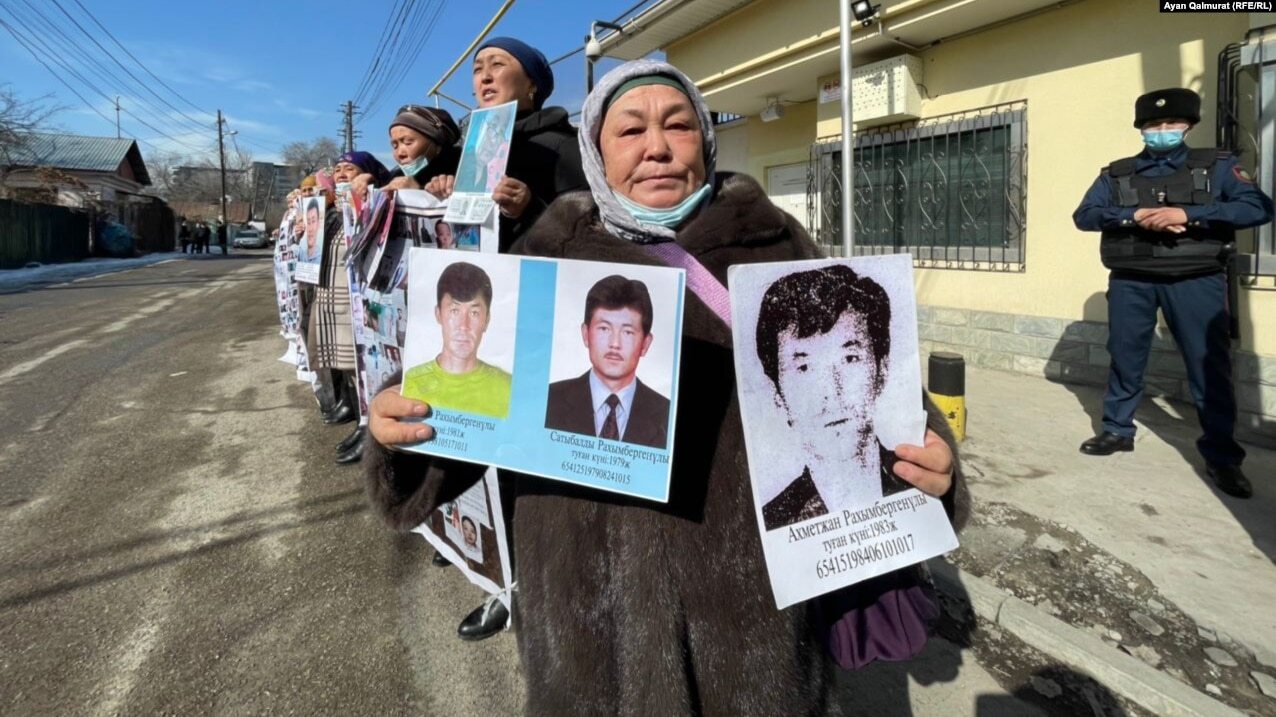Akytkhan has since become a mainstay at the pickets that, despite police intimidation, have endured outside the consulate since early February. She has joined dozens of other protesters who say their relatives are missing, jailed, or trapped in China’s ongoing crackdown.
United Nations human rights officials estimate that a million or more Uyghurs, Kazakhs, and other Muslim minorities are detained at camps in a vast Chinese internment system.
Sometimes Akytkhan travels by bus to make the 50-kilometer journey from her home to Almaty, Kazakhstan’s largest city. Other times she commutes in a shared taxi to the Chinese Consulate, where a loudspeaker at the compound warns protesters they could face prosecution for violating COVID restrictions.
Despite the long journey, constant surveillance by consulate guards, and a steady police presence, Akytkhan says she has no plans to stop joining the group of mostly women protesters. They gather there to demand safe passage home for their relatives — many of whom are Chinese-born ethnic Kazakhs who’ve become naturalized Kazakh citizens or permanent residents of the Central Asian country.
“I will keep going until I get even a tiny piece of information about my children,” Akytkhan tells RFE/RL. “I told these guards, ‘When it is warmer, I will come here with a blanket and will lie down.'”

The plight of ethnic Kazakhs and other groups interned in Xinjiang has been a source of uproar within Kazakhstan. The testimonies of former detainees, and family members like Akytkhan, fueled a guerrilla advocacy campaign that focused international attention on the issue — turning Kazakhstan into an unlikely window to document rights abuses in Xinjiang.
Akytkhan’s perseverance and the ongoing protests outside China’s consulate showcase that activism continues in Kazakhstan over the Chinese camps. But the situation today is a far cry from the groundswell of activity around the issue in 2018 and 2019 that forced the Kazakh government to walk a tightrope between appeasing Beijing and quelling an exasperated segment of its own population.
Since then, the government has led a swift crackdown against activists working on Xinjiang issues in the country. It has shut down organizations, arrested activists, and intimidated high-profile figures into exile, leaving only a small but devoted segment for public protests.
“The Kazakh government has long been trying to balance between these two problems,” says Temur Umarov, an expert on China in Central Asia at the Carnegie Moscow Center. “Xinjiang is an incredibly sensitive issue for Beijing and [the Kazakh government] knows it needs to keep ties with such an important economic, and increasingly political, partner strong,” Umarov tells RFE/RL.
Shining A Spotlight
Akytkhan, an ethnic Uyghur who married an ethnic Kazakh man, moved from Xinjiang to Kazakhstan and became a Kazakh citizen. One of her sons also moved across the border to Kazakhstan. But her other three sons, daughters-in-law, and 14 grandchildren stayed in China. All were eventually taken to the detention camps.
Now a widow, Akytkhan continues to campaign for her family. She received word from a local official in Xinjiang that her sons were transferred from the camps and sentenced to lengthy prison terms for crimes that she is not aware of.
Her daughters-in-law have since been released from the camps to take care of the children. But they remain under house arrest.
Complicated family connections across the border, like Akytkhan’s, are part of what made Kazakhstan a home for swelling activism about Xinjiang. It has been Kazakhs with relatives among Xinjiang’s ethnic Kazakh minority that have taken up the mantle.

Perhaps the loudest critic on the issue was Serikzhan Bilash. His Almaty-based Atajurt Eriktileri group was on the front lines of documenting and raising awareness about the mass detentions.
The group’s volunteers, with relatives detained or missing in Xinjiang, proved to be unusually effective in spreading information about China’s rights abuses. They worked with international media and rights groups by hosting regular press conferences and posting video testimony of recently released detainees.
“Only a small percentage of the Kazakhs that have been in camps have actually shared their stories publicly,” Bilash told RFE/RL. “It’s important to keep collecting more and more firsthand facts about what is happening in Xinjiang.”
But it didn’t take long for Kazakh authorities to become nervous about Bilash and Atajurt’s activities. The group’s attempts to be officially registered with the government were repeatedly denied. That was followed by a series of fines that ultimately culminated in the dramatic March 2019 arrest of Bilash on extremism charges, a common allegation in Kazakhstan for jailing government critics.
Bilash and Atajurt helped attract international attention to the case of Sairagul Sauytbay, an ethnic Kazakh Chinese citizen who crossed illegally from Xinjiang to Kazakhstan in 2018 after working at a camp. She was fleeing detention herself.
Sauytbay’s legal status in Kazakhstan was drawn out, as the government appeared to use her unresolved asylum request as a means to prevent her from speaking about her experiences as a camp worker in Xinjiang. She eventually left Kazakhstan in 2019 for Sweden, where she was granted asylum.
“The Kazakh government is more and more tied to Beijing and now the Kazakh government has lost its independence,” Bilash said. “They sold their independence to China.”
Bilash eventually accepted a plea bargain that required him to end his activism and keep a distance from Atajurt.
Shortly after, a splinter group made up of some of Bliash’s disaffected former associates was officially registered as Atajurt Eriktileri. But it has not continued the tactics of the previous group to raise awareness of Chinese rights abuses — choosing instead a far less vocal approach.
Yerbol Dauletbek, head of the officially registered group, told RFE/RL the organization will continue to help those affected by the crackdown in Xinjiang. But he said many people affected are now too scared to come forward and share their ordeal.
Dauletbek said he believes ethnic Kazakhs in the camps and those calling for their release have been “quietly abandoned” by Kazakhstan’s government. The episode highlights the government’s evolving strategy to impede Xinjiang activism in the country.
“Now the government is succeeding in intimidating and scaring people from coming forward,” Bilash says. “It is a signal and a warning to scare people from their activism and make them stay silent.”
Bilash eventually left Kazakhstan for Turkey before moving on to the United States. He says he plans to continue his activism there and register a U.S.-based organization focused on Xinjiang.
The Global Stage
China’s internment-camp system has received increased scrutiny and political pressure in recent years. The U.S. State Department recently accused China of committing “genocide and crimes against humanity” against Uyghurs. The Canadian and Dutch parliaments have both declared that the situation in Xinjiang is genocide.
The Chinese state has also been accused of an array of abuses in the region under the guise of the internment system, including forced labor, sterilization, torture, and rape.

But Beijing has also become more forceful in its pushback. Not only does China deny the genocide allegations. It says the camps are “reeducation” facilities for combating terrorism. And it has gone about intimidating and targeting those who speak out publicly about what they’ve witnessed in the camps.
Women who made allegations of rape and sexual abuse in February to the BBC were singled out by Beijing. In a series of press conference in March, Chinese Foreign Ministry spokesman Wang Wenbin and Xinjiang regional official Xu Guixiang held up photographs of women who gave firsthand testimony of sexual assault in camps. They insulted the women, calling them liars of “inferior character” and accusing them of adultery.

The Chinese ambassador to Kazakhstan, Zhang Xiao, has been outspoken in pushing back against accusations that Beijing is mistreating Kazakhs. The embassy’s Instagram page has taken to posting content meant to discredit Sauytbay, accusing her of fabricating the stories about her experiences in Xinjiang.
“[China] is trying its best to change this narrative about what is going on in Xinjiang,” the Carnegie Center’s Umarov says. “But it hasn’t changed much in Central Asia. I don’t think that Beijing has a well-thought-out strategy of how to cope with this problem.”
Kazakhstan’s Tightrope
The Kazakh government has avoided criticizing China and has publicly toed Beijing’s line about the camps — eager not to anger its main investor and strategic partner in the Belt and Road Initiative.
The authorities have elected a new approach to keep Xinjiang activism at bay. Following the high-profile case of Sauytbay, the government elected to avoid drawing international attention to another case. Instead, in October 2020, it granted temporary asylum to four ethnic Kazakhs who’d illegally crossed the border from Xinjiang into Kazakhstan.
Two of those Xinjiang-born asylum seekers who received temporary asylum, Qaisha Aqan and Murager Alimuly, were attacked the same day in January. Aqan was returning home from grocery shopping near Almaty when she was attacked. Alimuly was stabbed in the capital, Nur-Sultan.
Aqan says she believes the attacks were a politically motivated warning against becoming outspoken about Xinjiang, although she is not sure who was behind the attacks. “It was not random. In one day, [Alimuly] was stabbed and I was attacked,” she told RFE/RL. “The light [on the street] was switched off for two hours. All the [security] cameras stopped working [during my attack]. What a coincidence, right?”
Bekzat Maksutkhan, an associate of Bilash’s, runs a successor group to their original organization called Naghyz Atajurt, or “Real” Atajurt. But it remains unregistered and currently does not have an office.
Maksutkhan has followed the attacks on Alimuly and Aqan, as well as the protests outside the consulate. But he says it’s difficult to keep the organization going given financial pressure and growing intimidation from Kazakh authorities.
“We’ve never interfered with the government. We don’t have any economic interests, nor do we have any political interests. We just deal with human rights issues,” Maksutkhan told RFE/RL. “But we still face a lot of pressure and police often question us.”
With few grassroots organizations left to advocate and increased scrutiny from the authorities, protesters like Akytkhan feel that demonstrating outside the Chinese Consulate in Almaty is their last resort. Despite her age and health concerns that caused her to faint outside the consulate during one protest, Akytkhan says she won’t stop until she gets answers about her sons.
“At night, I take a photo of my three sons and hold it to my chest,” she says. “I can’t sleep without it. I put it next to my head on my pillow. Sometimes I can’t fall asleep until 5 a.m.”
By Reid Standish, Aigerim Toleukhanova






